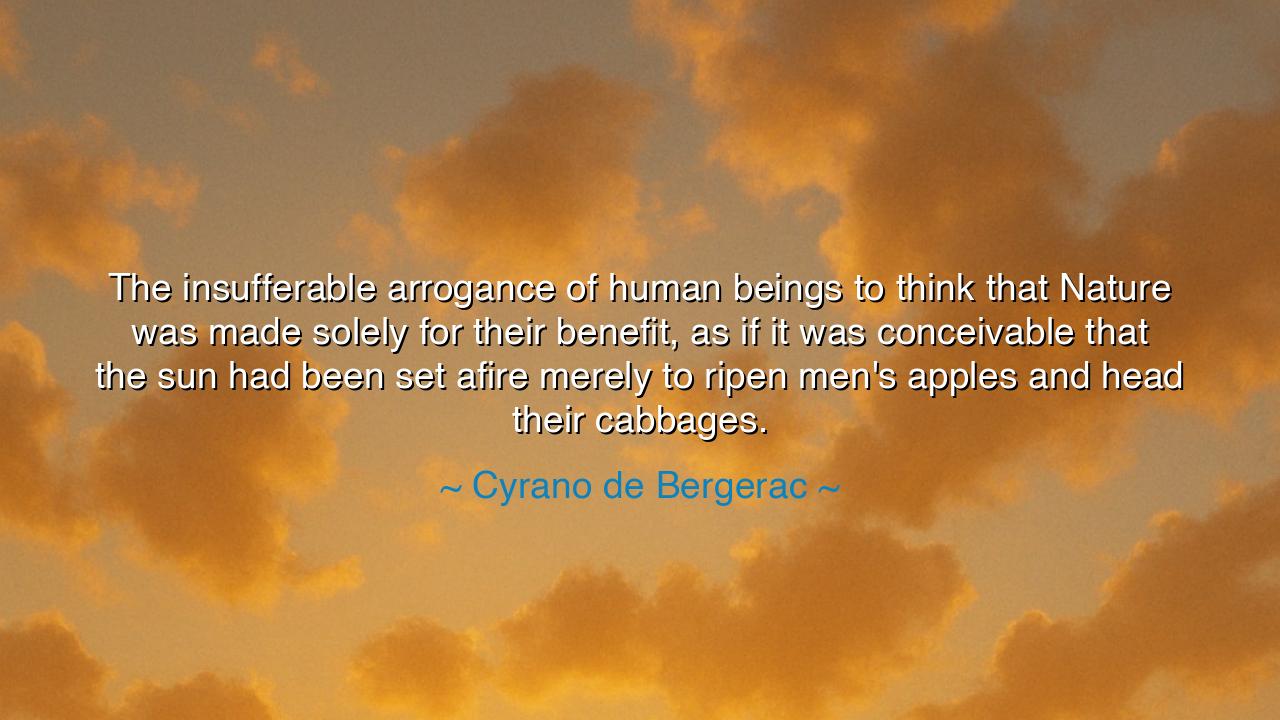
The insufferable arrogance of human beings to think that Nature
The insufferable arrogance of human beings to think that Nature was made solely for their benefit, as if it was conceivable that the sun had been set afire merely to ripen men's apples and head their cabbages.






Hear the burning words of Cyrano de Bergerac, poet, dreamer, and fearless satirist: “The insufferable arrogance of human beings to think that Nature was made solely for their benefit, as if it was conceivable that the sun had been set afire merely to ripen men’s apples and head their cabbages.” In this saying lies a sharp rebuke to the smallness of man’s vision, a scorn for the vanity that crowns itself master of the cosmos. Cyrano, with wit and flame, reminds us that the universe does not revolve around our appetites, nor does the sun burn for the sake of our gardens.
The heart of the saying lies in the contrast between man’s presumption and the grandeur of Nature. For what is man, but a fleeting breath upon the earth? Yet he dares to imagine that the heavens exist for his table, that the stars were hung for his delight, that the oceans were filled merely to season his meals. This is the arrogance Cyrano condemns—the blindness of those who cannot see that the world existed long before their birth and shall endure long after their passing. The sun blazed for aeons before the first eye beheld its light, and it will blaze long after our ashes return to dust.
History itself provides many warnings. In the age of conquest, European empires spread across the earth, cutting forests, enslaving peoples, and stripping lands, all under the belief that Nature was theirs to plunder. Forests vanished, rivers dried, and species perished, as if the world were nothing more than an orchard waiting for man’s harvest. But the earth, wounded, pushed back. Famine, disease, and collapse followed in the wake of greed. Here is Cyrano’s truth revealed: those who treat the universe as their servant soon discover it is their master.
Consider also the tale of Easter Island. Its people, in their arrogance, cut down every tree to raise their statues and fuel their ambitions, as though the island’s gifts were endless. Yet when the last tree fell, their society crumbled. Starvation, war, and ruin followed. They thought Nature existed for their glory, but in consuming it, they consumed themselves. This is the folly Cyrano mocks—the belief that the sun burns for our cabbages, when in truth we depend on it far more than it depends on us.
Yet his words are not only a rebuke; they are a summons to humility. For if we abandon arrogance, we may see the true wonder of Nature. The sun shines not for us alone, but for the mountains, the rivers, the forests, the creatures of the sea and sky. We are not lords of creation, but participants in its harmony, threads in its vast tapestry. To realize this is to awaken from delusion into reverence.
The lesson is clear: humble yourselves before Nature, and see it not as servant but as teacher. Learn patience from the seasons, resilience from the forest, endurance from the stars. Do not measure the world by your own appetite, but measure yourself by how well you honor the world. To live otherwise is to court ruin; to live in reverence is to find peace.
Practical steps may follow: plant where you have taken, replenish where you have consumed. Walk gently upon the earth, and let gratitude temper your use of its gifts. Teach your children not that the sun burns for their apples, but that their apples grow only because the sun, vast and impartial, shines on all. In doing so, you will pass down humility, the shield against arrogance, and reverence, the foundation of wisdom.
Remember always: the sun does not burn for us, yet without it we are nothing. Nature is not our servant, but our source. The wise will see this, and bow in gratitude. The foolish will ignore it, and perish by their pride. Cyrano’s words are both laughter and thunder, mocking our vanity, yet urging us toward reverence. Let us then cast aside arrogance and walk humbly beneath the blazing heavens, knowing we are but guests in the house of the eternal.






AAdministratorAdministrator
Welcome, honored guests. Please leave a comment, we will respond soon